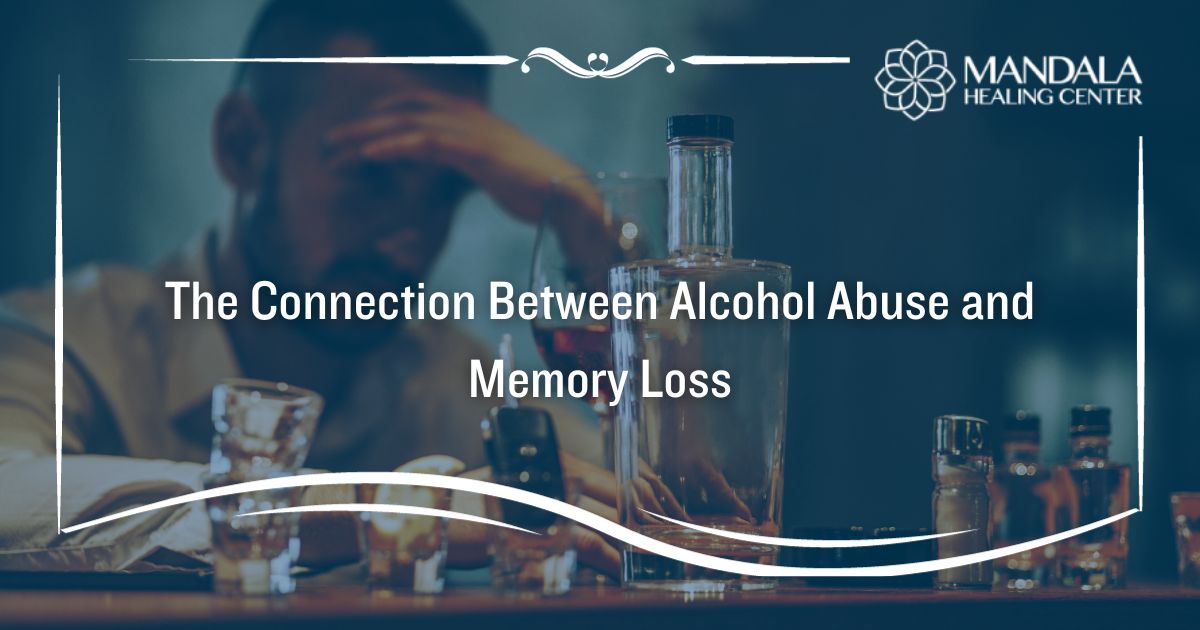Most people understand that a heavy night of drinking may lead to foggy or missing memories. But what is the actual relationship between alcohol abuse and memory loss?
Alcohol abuse can have a profound effect on your short and long-term memory. This article will explore the relationship between heavy drinking, alcohol abuse and addiction, and memory loss. For more information about getting treatment for alcohol abuse or dependence, contact the Mandala Healing Center specialists today.
The Connection Between Alcohol Abuse and Memory Loss
Medical and addiction experts have pinpointed several ways that alcohol consumption can affect your memory. Some of the effects are short-lived and occur during the time you are drinking, and some effects can linger for years– or be permanent.
Binge drinking or heavy drinking can lead to lapses in memory due to an elevated blood alcohol content, or BAC. People who drink heavily one night may wake up with little or no memory of what they did while intoxicated. These memory lapses are generally limited to the time when a person’s BAC is elevated. As they begin to sober up, they will regain the ability to make new memories.
Prolonged periods of heavy drinking can cause structural changes in the brain, resulting in significant short and long-term memory impairments.
Alcohol’s Effects on Short and Long-Term Memory
Alcohol can play a role in short and long-term memory loss. Here are some of the ways alcohol abuse and memory loss of all kinds are connected.
Short-term memory
Alcohol affects short-term memory by changing how nerves in the hippocampus–an area of the brain responsible for memory– communicate with each other. People who drink may lose their ability to make new memories while intoxicated as activity in the hippocampus slows down.
The severity of your short-term memory loss depends partly on how much alcohol you’ve consumed. People may find that after a few drinks, they forget small details, such as where they put their phone or the details of a conversation. Drinking more alcohol can lead people to forget entire hours of their lives. This effect is most likely to happen after consuming five or more alcoholic drinks.
Long-term memory
Long periods of frequent heavy drinking can damage the hippocampus by killing nerve cells in this area. When damage occurs, people may notice significant short- and long-term memory impairments.
Alcohol-Related Dementia
Dementia is a severe degenerative condition resulting in a loss of cognitive functioning. People with dementia often struggle with activities of daily life. In some cases, there is no apparent cause for dementia. However, heavy alcohol use can cause one type of dementia.
Alcohol-related dementia is caused by thiamine (vitamin B-1) deficiency. Alcohol changes how your body processes and uses thiamine, which is essential to energy production and nerve health. Excessive alcohol consumption can also affect thiamine levels in other ways, including:
- Contributing to a poor diet that lacks vital nutrients, including thiamine
- Causing inflammation of the stomach lining, preventing the absorption of thiamine and other nutrients
- Leading to frequent vomiting and improper nutrient intake
Alcohol-related dementia is progressive–meaning that it will get worse over time–and permanent.
Wernicke-Korsakoff Syndrome
Wernicke-Korsakoff Syndrome is a condition that affects cognition, memory, and other areas of brain functioning. This condition develops when someone lacks thiamin and can cause severe, sometimes life-threatening symptoms.
Wernicke-Korsakoff Syndrome occurs in two stages.
- Wernicke encephalopathy, which is a severe disorder of the brain
- Korsakoff syndrome, which is a chronic memory disorder
If a person develops Wernicke encephalopathy and does not receive treatment, they are likely to develop Korsakoff Syndrome, which can be life-threatening. Identifying Wernicke encephalopathy is essential to preventing long-term memory problems. The three primary symptoms of Wernicke encephalopathy are:
- Confusion
- Inability to coordinate movements
- Visual changes and other eye problems
Without treatment, these symptoms can damage nerve cells in the brain, resulting in permanent damage. Wernicke-Korsakoff Syndrome is progressive and can become life-threatening without treatment, which includes thiamine therapy.
Do I Need Treatment for Alcohol Abuse?
Alcohol use is common and widely accepted in the United States, and it can be difficult to determine when your alcohol use has become problematic. Identifying problematic drinking patterns, alcohol abuse, and addiction earlier can give you the best chance to recover fully.
Some of the signs of alcoholism include:
- Needing to drink more to get “buzzed” than you did before
- Thinking about when you’ll have your next drink frequently
- Spending a lot of time getting alcohol, drinking, and recovering from hangovers
- Missing work or neglecting other responsibilities because you are intoxicated or hungover
- Experiencing withdrawal symptoms like tremors, nausea, anxiety, sweating, or insomnia if you stop drinking
- Wanting to stop or reduce your drinking but discovering you can’t
- Craving alcohol
These signs of alcohol abuse could indicate that you need help to stop drinking. The support of a comprehensive alcohol abuse treatment program can give you the treatment, skills, and community you need to stop drinking and live a healthier, sober lifestyle for good.
Get Alcohol Abuse Treatment Now
If you or someone in your life struggles with alcohol abuse or addiction, don’t wait to get the help you need. Reach out to the Mandala Healing Center team now to learn about our holistic approach to alcohol rehab. The treatment you need is available–and it works. Call today.
References:
- National Library of Medicine: What Happened? Alcohol, Memory Blackouts, and the Brain, Retrieved September 2023 from https://www.ncbi.nlm.nih.gov/pmc/articles/PMC6668891/
- Science Direct: Alcohol and memory: Retrieval processes, Retrieved September 2023 from https://www.sciencedirect.com/science/article/abs/pii/S0022537178902104
- National Library of Medicine: Wernicke-Korsakoff Syndrome, Retrieved September 2023 from https://www.ncbi.nlm.nih.gov/books/NBK430729/












